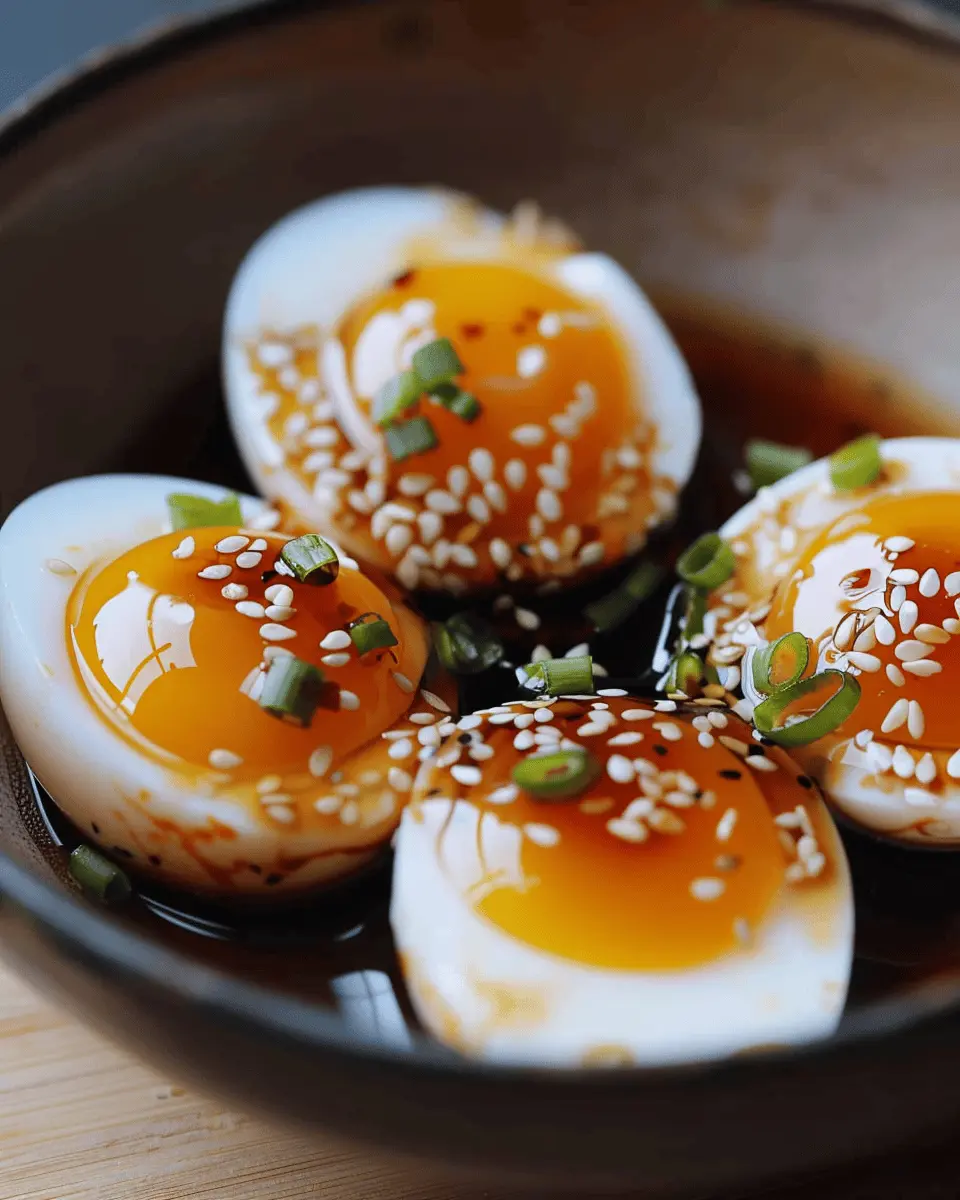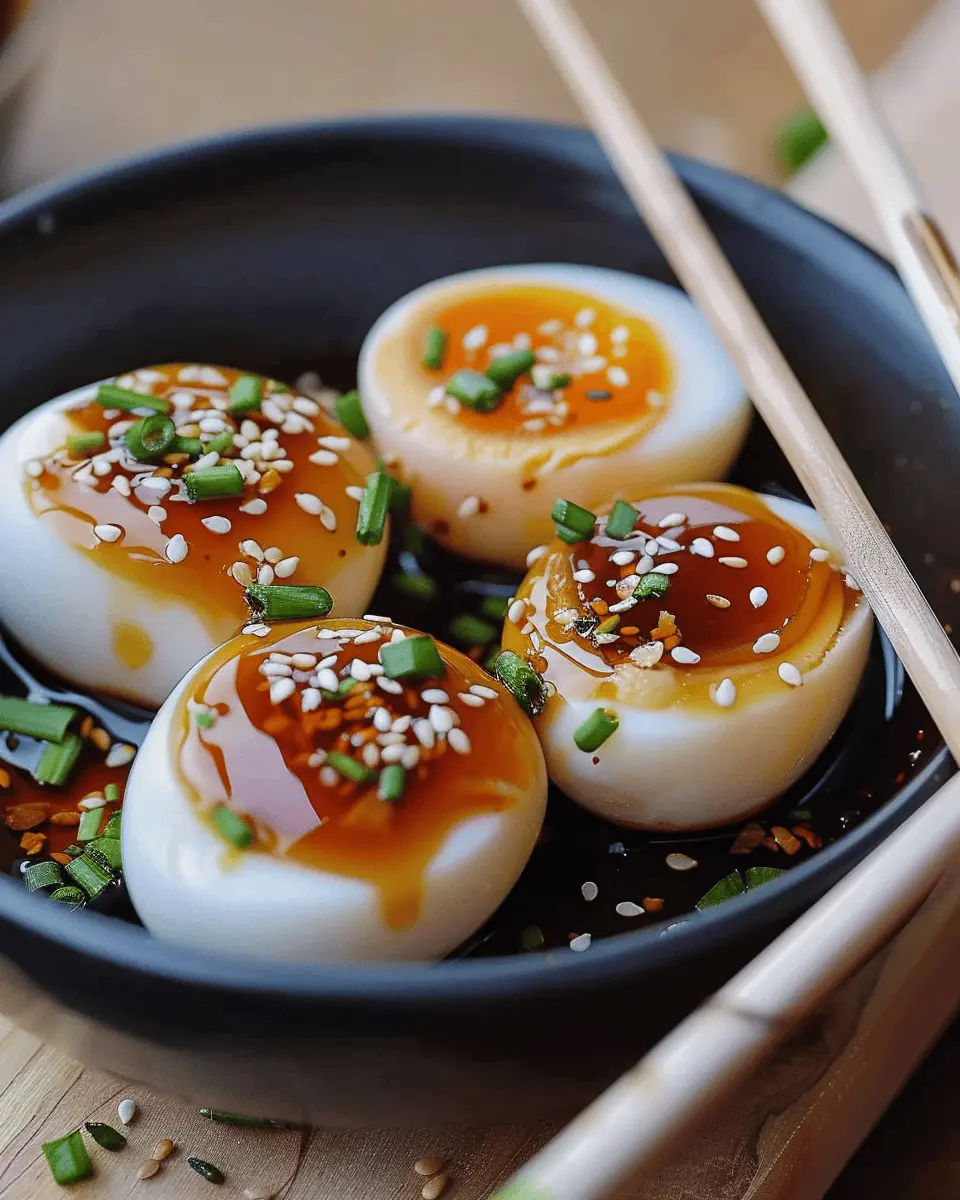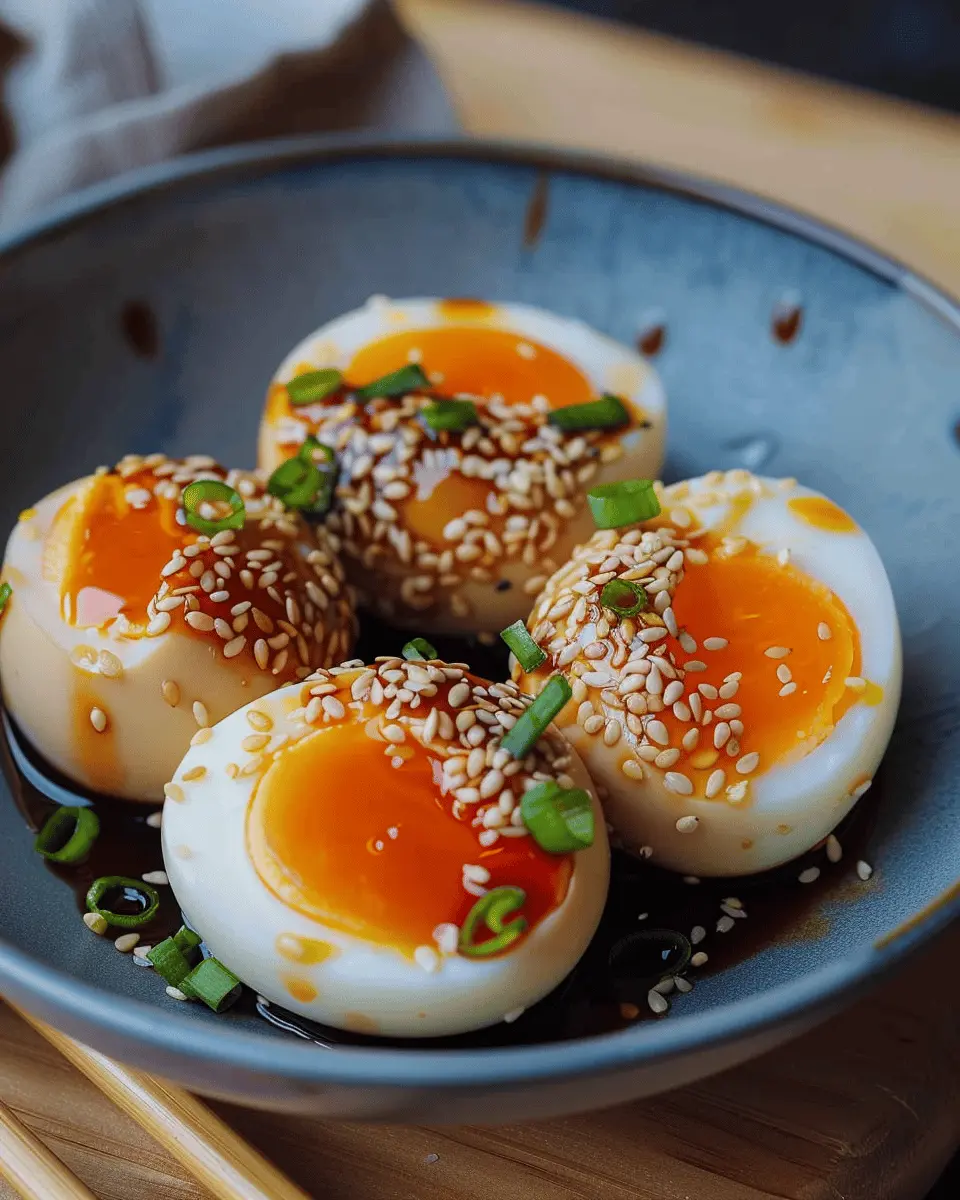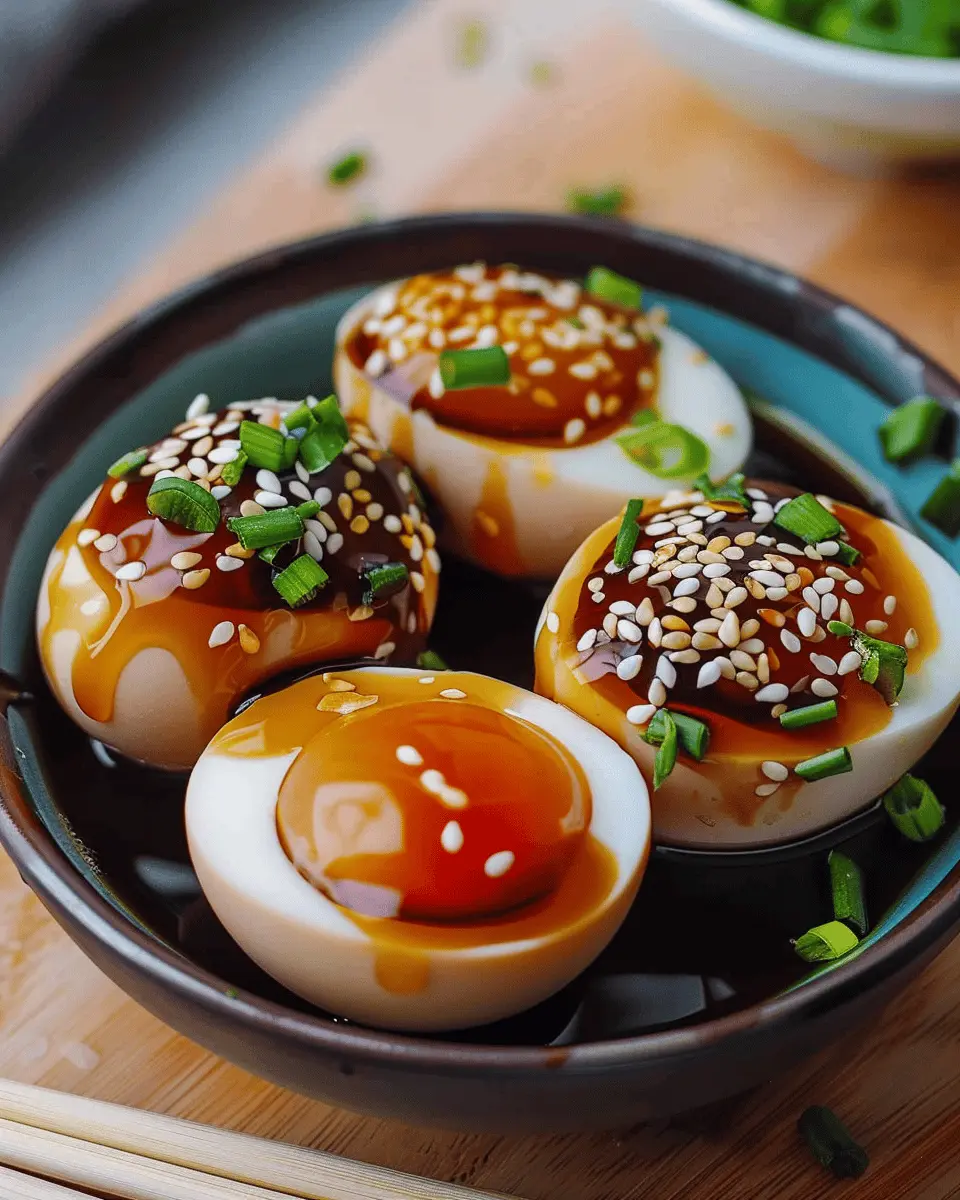Introduction to Soy Sauce Eggs
If you’re looking for a delicious, protein-packed snack, then soy sauce eggs should be right at the top of your list. These flavorful, umami-rich treats are not just a delightful addition to your meals but also a fantastic standalone snack. The beauty of soy sauce eggs lies in their simplicity and versatility. Whether you’re a busy young professional or someone who enjoys hosting friends for dinner, these little gems are easy to whip up and are sure to impress.
Why Are Soy Sauce Eggs the Ultimate Homemade Snack?
So, what makes soy sauce eggs the ultimate homemade snack? Let’s break it down:
-
Quick and Easy: Just a few ingredients—hard-boiled eggs, soy sauce, and some optional aromatics—are all you need. The cooking process is straightforward; simply boil your eggs, marinate them in soy sauce, and voila! You have an addictive snack ready to go.
-
Full of Flavor: The rich taste of the soy sauce infuses the eggs with a salty and savory punch. You can even customize the flavor by adding crushed garlic, ginger, or even a touch of sesame oil.
-
Nutritionally Dense: Eggs are packed with protein, vitamins, and essential nutrients like vitamin B12 and choline. When combined with soy sauce, you create a snack that’s not only satisfying but also beneficial for your health.
-
Perfect for Meal Prep: Whether you’re prepping for the week ahead or hosting a casual dinner, soy sauce eggs are fantastic for meal planning. They store well in the fridge and make for an easy grab-and-go snack or a topping for salads and rice bowls.
Incorporating soy sauce eggs into your routine also opens the door to various culinary possibilities. Perhaps you’d like to try them in a ramen bowl or as a protein addition to your favorite grain salad? The options are nearly endless!
Finally, if you want to learn more about the cultural significance of soy sauce in various cuisines, check out this article from Serious Eats on the history of soy sauce.
With their delightful taste and effortless preparation, soy sauce eggs are a snack that you’ll definitely want to try making at home. Let’s get started with the recipe!

Ingredients for Soy Sauce Eggs
Creating delicious soy sauce eggs at home is simpler than you might think! Here’s a quick rundown of the essential ingredients you’ll need to make this savory treat.
Essential ingredients for a perfect soy sauce egg
To craft those rich, flavorful soy sauce eggs, gather the following essentials:
- Eggs: Fresh, large eggs are the star of this dish. They should be room temperature to ensure even cooking.
- Soy Sauce: A high-quality soy sauce, whether light or dark, infuses your eggs with umami goodness. Opt for organic if you can!
- Water: This is used to dilute the soy sauce, making the brine perfect for soaking.
- Mirin or Honey: A splash of mirin adds a sweet balance to the salty soy sauce. If you prefer a healthier option, honey works beautifully, too.
- Sesame Oil: Just a hint of sesame oil enhances the overall flavor profile.
These ingredients create a delicious marinade that makes your soy sauce eggs addictive. If you want to learn more about the best brands, check out Serious Eats for expert reviews!
Step-by-Step Preparation of Soy Sauce Eggs
Making soy sauce eggs is not only a delectable choice for enhancing your meals; it’s also a fun culinary project that you can enjoy in under an hour. Let’s dive into the process and bring some savory goodness to your kitchen!
Gather Your Cooking Equipment
Before you start cooking, it’s vital to have everything you need on hand. Here’s a quick checklist:
- A medium pot for boiling the eggs
- A slotted spoon to remove the eggs from hot water
- A bowl for your ice bath
- A measuring cup for the marinade
- A small pot or bowl to mix your marinade
- A refrigerator-safe container for marinating the eggs
Having your tools ready not only saves you time but also makes the cooking experience more enjoyable. Preparation is half the fun!
Boil the Eggs to Perfection
Achieving the perfect boiled egg is crucial for your soy sauce eggs. Here’s how to do it right:
- Place your eggs in the medium pot and cover them with cold water. The water should be about an inch above the eggs.
- Put the pot on high heat and bring it to a simmer. Once the water reaches a rolling boil, cover the pot with a lid and turn off the heat. Let the eggs sit for about 9-12 minutes, depending on how runny you want the yolk. For a wonderfully creamy yolk, aim for 9 minutes.
- Meanwhile, you can use this downtime to prepare your marinade.
This method gives you perfect, creamy yolks without the frustration of overcooking.
Cool the Eggs in an Ice Bath
Once your eggs are cooked to perfection, it’s time to cool them down. Here’s why this step is essential:
- Cooling the eggs in an ice bath stops the cooking process instantly, ensuring your yolks remain soft and flavorful.
To prepare the ice bath:
- Fill a large bowl with cold water and ice cubes.
- After the timer goes off, carefully transfer the eggs from the hot pot to the ice bath using your slotted spoon.
- Let them sit for about 5-10 minutes until they’re cool to the touch.
Not only does this step preserve the ideal texture of your soy sauce eggs, but it also makes peeling easier.
Prepare the Soy Sauce Marinade
Now that your eggs are cooled, let’s create the marinade—a critical step for infusing the soy sauce eggs with robust flavor. Here’s what you’ll need:
- ½ cup soy sauce
- ½ cup water
- 1 tablespoon sugar (to balance the saltiness)
- 1 teaspoon rice vinegar (for a slight tang)
- Optional: a dash of sesame oil or garlic for added depth
In a small pot or bowl, mix all these ingredients together. For a unique twist, consider adding a sprinkle of star anise or a piece of ginger for an aromatic infusion.
Marinate the Eggs to Achieve Optimal Flavor
With your marinade ready, it’s time for the magic to happen. Follow these steps for delicious results:
- Gently peel the cooled eggs—this should be easier thanks to the ice bath.
- Place the peeled eggs in the refrigerator-safe container and pour the marinade over them, ensuring they’re fully submerged. If you’re short on time, you can use a zip-lock bag for deep flavor penetration.
- Let the eggs marinate in the refrigerator for at least 4 hours, or ideally overnight for that deep, rich flavor.
The longer the marination, the better your soy sauce eggs will taste. This allows the soy sauce to penetrate the egg whites, turning each bite into a flavorful delight!
Now you have a step-by-step guide to preparing delicious soy sauce eggs. By ticking off each of these steps, you’ll find yourself with a dish bursting with flavor, ready to elevate any meal. Whether served alongside rice, as a topping for ramen, or simply enjoyed as a snack, these eggs are sure to impress. Happy cooking!

Variations on Soy Sauce Eggs
When it comes to adding a twist to your classic soy sauce eggs, cultures around the world have delicious takes. Each variation brings its own flavor profile and cooking technique, making your cooking experience even more exciting. Let’s dive into a couple of popular styles that you can easily recreate at home!
Korean-style Marinated Eggs
Korean-style soy sauce eggs are a fantastic side dish known as Gyeran Jangjorim. These eggs are boiled and then marinated in a soy sauce mixture infused with garlic, sesame oil, and a hint of green onion. The savory notes of soy sauce combined with the nuttiness of sesame oil create an irresistible flavor!
- Key Ingredients:
- Soy sauce
- Minced garlic
- Sesame oil
- Green onion
- To prepare, simply boil your eggs, peel them, and let them soak in the marinated mixture for at least a couple of hours (or overnight for more flavor). It’s the perfect addition to a rice dish or just as a tasty snack!
Japanese Ramen Eggs
Another tempting variation is the Japanese ramen egg, or Ajitsuke Tamago. These eggs are marinated in a soy sauce-based mixture with mirin and a touch of dashi, resulting in a delightfully rich taste that pairs perfectly with your bowl of ramen.
- Key Ingredients:
- Soy sauce
- Mirin (or substitute with a sweet rice vinegar)
- Dashi (you can use instant stock)
- After boiling and peeling, marinate your eggs in this mixture for about four hours for the best infusion of flavors. The creamy yolk, combined with umami flavors, will elevate any noodle dish.
Exploring variations like these not only enhances your cooking repertoire but also brings a taste of global cuisine to your table. Check out more about the cultural significance of these dishes on Serious Eats. Happy cooking!
Cooking Tips and Notes for Soy Sauce Eggs
Best Practices for Boiling Eggs
Boiling eggs may seem straightforward, but a few best practices can elevate your game. Start by placing your eggs in a single layer in a pot and covering them with cold water about an inch above the eggs. Bring the water to a gentle boil over medium heat. Once boiling, reduce to low and cover the pot. For perfectly cooked eggs, follow these timings:
- 6 minutes for soft, creamy yolks
- 8-10 minutes for slightly firmer centers
Remember to plunge them into an ice bath right after cooking. This stops the cooking process and makes peeling easier!
How to Store Leftover Soy Sauce Eggs
If you find yourself with extra soy sauce eggs, you’re in luck—they store beautifully! Keep them submerged in the marinade in a glass container in the fridge, where they can last for up to a week. The flavors will infuse more over time, making them even tastier as the days go by. For further insights on storage and recipe variations, check out this guide. Enjoy your culinary adventure!

Serving Suggestions for Soy Sauce Eggs
Perfect Pairings: Rice Bowls and Noodle Dishes
When it comes to savoring soy sauce eggs, they shine brightest alongside rice bowls or noodle dishes. Imagine a fluffy bowl of steamed jasmine rice topped with sliced soy sauce eggs, scallions, and a drizzle of sesame oil. This balance of flavors makes for a comforting meal that’s perfect for busy weeknights.
For noodle lovers, adding these eggs to stir-fried noodles or ramen brings a delightful umami touch. The rich soy sauce flavor beautifully complements broth-based dishes, creating a satisfying harmony that warms the soul. If you’re curious about more noodle inspiration, consider checking out Serious Eats for some ideas.
Creative Ways to Elevate Your Soy Sauce Eggs
Want to take your soy sauce eggs to the next level? Try incorporating them into:
- Salads: Add sliced soy sauce eggs to a fresh salad for a protein-packed boost.
- Sandwiches: Use them in a savory sandwich with grated carrots and turkey bacon for a delightful crunch.
- Toast: Top your avocado toast with a halved soy sauce egg for a trendy brunch idea.
These simple additions not only enhance the dish but also allow your culinary creativity to shine. Just think of all the delicious combinations waiting to be discovered!
Time Breakdown for Soy Sauce Eggs
When it comes to making soy sauce eggs, knowing your time commitments can make all the difference. Here’s a quick breakdown to guide your cooking adventure.
Preparation time
Getting started on your soy sauce eggs is a breeze! You’ll only need about 10 minutes to gather your ingredients, boil some water, and prepare the brine. Just think of it as your pre-game warm-up.
Cooking time
The magic happens in the cooking phase, which takes roughly 30 minutes. This includes boiling your eggs to perfection, allowing them to cool, and soaking them in that delicious soy sauce mixture. It’s hard to resist the aroma wafting through your kitchen during this time!
Total time
In total, you’re looking at approximately 40 minutes from start to finish. Not too long for such a flavorful treat! So why not whip up a batch of soy sauce eggs this weekend? Your taste buds will thank you! For more cooking tips and techniques, check out resources from Serious Eats or Bon Appétit.
Nutritional Facts for Soy Sauce Eggs
When it comes to delicious yet nutritious snacks, soy sauce eggs are a fantastic choice! Here’s a quick breakdown of their nutritional profile:
Calories per egg
Each soy sauce egg contains approximately 70 calories, making it a guilt-free option for those keeping an eye on their caloric intake.
Protein content
These protein-packed delights offer about 6 grams of protein per egg, making them an excellent addition to boost your daily intake. Perfect for refueling after a workout or as part of a hearty breakfast!
Sodium levels
However, it’s important to note that soy sauce eggs do contain a higher sodium level, roughly 350-400 mg per egg. While they can add flavor to your meals, moderation is key, especially for those monitoring their sodium intake.
For more insights on soy sauce’s health implications, consider checking out sources like the American Heart Association. Adding soy sauce eggs to your diet can be both tasty and nutritious when balanced with other healthy foods!
FAQs about Soy Sauce Eggs
When diving into the world of soy sauce eggs, you may have a few questions rattling around in your mind. Don’t worry; I’ve got you covered!
How long should I marinate my soy sauce eggs?
Marinating time is key for achieving that perfect flavor. For the best results, aim to marinate your soy sauce eggs for about 4 to 6 hours. However, if you want a more pronounced flavor, consider letting them soak overnight. Just remember, the longer you marinate, the saltier and richer the taste will be, so strike a balance that suits your palate.
How can I achieve the perfect jammy yolk?
Getting that signature jammy yolk is easier than it sounds! Start by gently boiling your eggs for 6 to 7 minutes. Once they’re done, promptly place them in an ice bath to stop the cooking process and make peeling easier. The secret lies in this timing: a couple of minutes can mean the difference between a runny yolk and a firm one. Experiment a bit to determine your ideal yolk consistency!
Can I use different types of soy sauce?
Absolutely! While traditional soy sauce works wonderfully for soy sauce eggs, you can also experiment with different types. For example, using a dark soy sauce can add depth and a touch of sweetness, while light soy sauce might lend a more delicate flavor. Try blending them for a unique taste experience! If you’re unsure where to start, check out this detailed guide on types of soy sauce for more insights.
Feel free to reach out in the comments if you have any more questions or tips about preparing soy sauce eggs!
Conclusion on Soy Sauce Eggs
Why These Eggs Deserve a Permanent Spot in Your Kitchen
Soy sauce eggs are not just a delicious addition to your meals; they elevate everyday dishes into something extraordinary. With their rich flavor profile, these eggs can complement a variety of cuisines—from Asian-inspired bowls to brunch favorites. Plus, they’re surprisingly easy to make!
Imagine having a batch on hand to enhance your ramen, salads, or even as a snack on their own. Storing in the fridge allows you to enjoy these savory gems throughout the week without fuss.
As you explore more with them, consider checking out Cooking Light for innovative tips and ideas to incorporate soy sauce eggs into your favorite recipes!
So, embrace the journey of flavors and let these versatile treats find a prominent place in your kitchen. You won’t regret it!
PrintSoy Sauce Eggs: Easy and Flavorful Comfort Food Delight
Delight in the rich flavor of soy sauce eggs, a simple yet satisfying comfort food perfect for any meal.
- Prep Time: 10 minutes
- Cook Time: 7 minutes
- Total Time: 40 minutes
- Yield: 4 servings 1x
- Category: Snacks
- Method: Boiling
- Cuisine: Asian
- Diet: Vegetarian
Ingredients
- 4 large eggs
- 1/4 cup soy sauce
- 1 tablespoon rice vinegar
- 1 teaspoon sugar
- 1/4 teaspoon black pepper
- 1 tablespoon sesame oil
Instructions
- In a pot, bring water to a boil and gently add the eggs. Boil for 6-7 minutes for a soft center.
- Remove the eggs and place them in an ice bath to cool down quickly.
- In a bowl, mix soy sauce, rice vinegar, sugar, black pepper, and sesame oil.
- Peel the cooled eggs and place them in the soy sauce mixture for at least 30 minutes.
- Serve the soy sauce eggs sliced on top of rice or as a snack.
Notes
- For extra flavor, marinate the eggs overnight.
- Try adding garlic or ginger to the marinade for added depth.
Nutrition
- Serving Size: 1 egg
- Calories: 70
- Sugar: 1g
- Sodium: 600mg
- Fat: 5g
- Saturated Fat: 1g
- Unsaturated Fat: 3g
- Trans Fat: 0g
- Carbohydrates: 1g
- Fiber: 0g
- Protein: 6g
- Cholesterol: 186mg
Keywords: Soy Sauce Eggs












